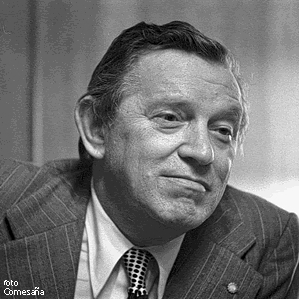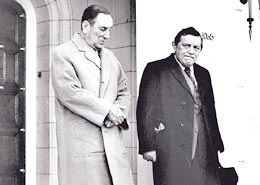José Ber Gelbard facts for kids
Quick facts for kids
José Ber Gelbard
|
|
|---|---|
 |
|
| Minister of Economy | |
| In office 25 May 1973 – 21 October 1974 |
|
| President |
See list
|
| Preceded by | Jorge Wehbe |
| Succeeded by | Alfredo Gomez Morales |
| Personal details | |
| Born |
Joseph Gelbard
14 April 1917 Radomsko, Poland |
| Died | 4 October 1977 (aged 60) Washington, D.C., U.S. |
| Nationality | Argentine |
| Political party | Communist Party |
| Spouse |
Dina Haskel
(m. 1938) |
| Occupation | Businessman |
| Signature |  |
José Ber Gelbard (born April 14, 1917 – died October 4, 1977) was an important figure in Argentina. He was born in Poland and later became an Argentine activist and politician. He was a member of the Communist Party of Argentina.
Gelbard played a big role in creating the Confederación General Económica (CGE). This group brought together many small and medium-sized businesses. Starting around 1954, he became a trusted economic advisor to Juan Perón. He was often called back to serve as the Minister of Economy for different governments. He left Argentina with his family just before a military takeover in March 1976. He found safety in the United States, settling in Washington, D.C..
Contents
Early Life and Moving to Argentina
José Ber Gelbard was born Joseph Gelbard in 1917 in Radomsko, Poland. His family was Jewish. In 1930, when he was 13, his family moved to Argentina. They settled in San Miguel de Tucumán, which is about 800 miles (1,287 km) north of Buenos Aires. Other family members and immigrant communities were already living there. During the Great Depression, a time when many people lost their jobs, Gelbard helped his family. He worked as a street seller, selling men's ties and belts.
Family Life
By 1938, Gelbard had saved some money. He married Dina Haskel. They moved to Catamarca Province, where he opened a men's clothing store called "Casa Nueva York." They had children, including a son named Fernando Gelbard. Fernando later became a talented jazz musician. He played the piano and flute, and also composed music.
Political Journey
Gelbard became involved in activism, especially with the Communist Party. He helped Jewish groups protect their community in Tucumán from local groups that were against them. He also joined a group called the Democratic Union. This group was against Juan Perón during the 1945–46 elections.
Gelbard soon became a leader in the Chamber of Commerce in Catamarca. He spoke for small and medium businesses. Many of these business owners were immigrants or new to the business world. He believed that these millions of small businesses needed to work together. This way, they could have a stronger voice and negotiate with Perón's government, which supported workers. Gelbard became a key thinker for these businesses. He strongly believed that businesses, the government, and workers should team up. They would work together for a strong, independent economy for Argentina.
Forming the CGE
During this time, Gelbard helped create the CGE (Confederación General Económica). This was a large group of millions of business owners and factory owners. It was strong enough to talk with the government and labor unions. In 1953, he traveled all over Argentina to organize business people under the CGE. He was chosen as its first president.

In 1954, Gelbard and his family moved to Buenos Aires. Soon after, he was asked to join Perón's government. He became a minister without a specific department, focusing on economic issues. He continued to fight for small and medium businesses. He was against big foreign companies and large farming businesses. These groups wanted Argentina to only export grains and cattle. Gelbard strongly disagreed with the idea of Argentina being just "The world's barn." The CGE also had a strong presence in the government. Its leaders were part of important economic committees. They helped make decisions about housing, prices, jobs, and foreign relations.
Changes in Government
In 1955, the military took over the government in a coup d'état. They removed Perón from power. The new military government took legal action against Gelbard and froze his money. This was because he was known as Perón's advisor. In the years that followed, Argentina saw many changes. There were new elections, more military takeovers, and new presidents. Gelbard was always called upon to advise these new leaders on economic matters. In 1972, he even helped negotiate the return of General Juan Perón from his exile in Madrid.
After many secret talks, new elections were held. Juan Perón was not yet allowed to be president. So, his friend Dr. Héctor Cámpora ran and was elected president on May 25, 1973. Perón asked Cámpora to appoint Gelbard as the Minister of Economy.
Minister of Economy
Later that year, Cámpora stepped down, and Perón was elected president. His third wife, Isabel Perón, became his vice president. As Minister, Gelbard introduced "The Social Pact" (El Pacto Social). This was an agreement between businesses and workers. It called for a freeze on prices and salaries. The goal was to help the country's economy grow. It also aimed for better cooperation between businesses and the government.
Gelbard worked to increase exports. He lifted the trade ban with Cuba on his own. He sold one billion dollars worth of goods to Cuba. This included cars made in Argentina by American companies. The United States had to accept this because Gelbard threatened to close all US car factories in Argentina. He also led many economic trips. He took large groups of Argentine business leaders to countries like Cuba, Venezuela, Chile, the Soviet Union, and Poland.
On July 1, 1974, Perón died. His wife, Isabel Perón, became president. The economy faced challenges, including rising demands for higher wages and the 1973 oil shock. The Social Pact became harder to maintain. In November 1974, Gelbard resigned. The country's economy was struggling, and his plans were not working as hoped.
In March 1976, the military again took over the government. They removed Isabel Perón from power. Gelbard and his family left Argentina before this takeover. They found political safety in the United States. All his money and property in Argentina were frozen. The military government later sentenced Gelbard and his son Fernando to death, even though they were not in the country.
Death
On October 4, 1977, José Ber Gelbard died from a heart attack. He was 60 years old and living in Washington, D.C..
Later, after Argentina returned to a democratic government, his son Fernando came back to Argentina. In 1989, Fernando became the Argentine ambassador to France.
Images for kids
 | Misty Copeland |
 | Raven Wilkinson |
 | Debra Austin |
 | Aesha Ash |


